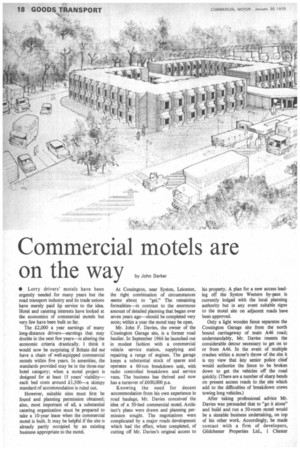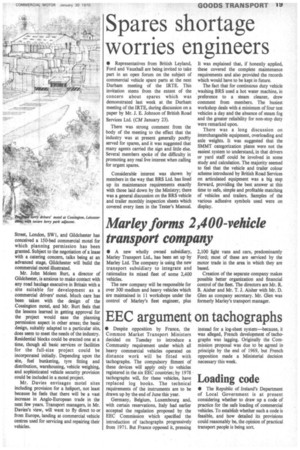Commercial motels are
Page 20

Page 21

If you've noticed an error in this article please click here to report it so we can fix it.
on the way by John Darker
• Lorry drivers' motels have been urgently needed for many years but the road transport industry and its trade unions have merely paid lip service to the idea. Hotel and catering interests have looked at the economics of commercial motels but very few have been built so far.
The £2,000 a year earnings of many long-distance drivers—earnings that may double in the next few years---is altering the economic criteria drastically. I think it would now be surprising if Britain did not have a chain of well-equipped commercial motels within five years. In amenities, the standards provided may be in the three-star hotel category; when a motel project is designed for at least 15 years' viability— each bed costs around £1,500—a skimpy standard of accommodation is ruled out.
However, suitable sites must first be found and planning permission obtained; also, most important of all, a substantial catering organization must be prepared to take a 10-year lease when the commercial motel is built. It may be helpful if the site is already partly occupied by an existing business appropriate to the motel. At Cossington, near Syston, Leicester, the right combination of circumstances seems about to "gel," The remaining formalities—in contrast to the enormous amount of detailed planning that began over seven years ago—should be completed very soon; within a year the motel may be open.
Mr. John F. Davies, the owner of the Cossington Garage site, is a former road haulier. In September 1966 he launched out in modest fashion with a commercial vehicle service station, supplying and repairing a range of engines. The garage keeps a substantial stock of spares and operates a 60-ton breakdown unit, with radio controlled breakdown and service vans. The business has thrived and now has a turnover of £600,000 p.a.
Knowing the need for decent accommodation from his own experience in road haulage. Mr. Davies conceived the idea of a 50-bed commercial motel. Architect's plans were drawn and planning permission sought. The negotiations were complicated by a major roads development which had the effect, when completed, of cutting off Mr. Davies's original access to his property. A plan for a new access leading off the Syston Western by-pass is currently lodged with the local planning authority but in any event suitable signs to the motel site on adjacent roads have been approved.
Only a light wooden fence separates the Cossington Garage site from the north bound carriageway of main A46 road; understandably, Mr. Davies resents the considerable detour necessary to get on to or from A46. In the event of multiple crashes within a stone's throw of the site it is my view that any senior police chief would authorize the fence to be broken down to get the vehicles off the road quickly. (There are a number of sharp bends on present access roads to the site which add to the difficulties of breakdown crews towing long vehicles.)
After taking professional advice Mr. Davies was persuaded that to "go it alone" and build and run a 50-room motel would be a sizeable business undertaking, on top of his other work. Accordingly, he made contact with a firm of developers, Gildchester Properties Ltd., 1 Chester Street, London, SW1, and Gildchester has conceived a 150-bed commercial motel for which planning permission has been granted. Subject to the negotiation of a lease with a catering concern, talks being at an advanced stage, Gildchester will build the commercial motel illustrated.
Mr. John Molem Burt, a director of Gildchester, is anxious to make contact with any road haulage executive in Britain with a site suitable for development as a commercial drivers' motel. Much care has been taken with the design of the Cossington motel, and Mr. Burt feels that the lessons learned in getting approval for the project would ease the planning permission aspect in other areas; the basic design, suitably adapted to a particular site, does seem to meet the needs of the industry. Residential blocks could be erected one at a time, though all basic services or facilities for the full-size project could be incorporated initially. Depending upon the site, fuel bunkering, tyre fitting and distribution, warehousing, vehicle weighing, and sophisticated vehicle security provision could be included in a motel project.
Mr. Davies envisages motel sites including provision for a heliport, not least because he feels that there will be a vast increase in Anglo-European trade in the next few years. Transport managers, in Mr. Davies's view, will want to fly direct to or from Europe, landing at commercial vehicle centres used for servicing and repairing their vehicles.






























































































